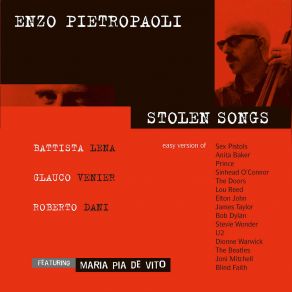Stolen Songs
Download links and information about Stolen Songs by Enzo Pietropaoli. This album was released in 1999 and it belongs to Jazz genres. It contains 15 tracks with total duration of 48:12 minutes.

|
|
|---|---|
| Artist: | Enzo Pietropaoli |
| Release date: | 1999 |
| Genre: | Jazz |
| Tracks: | 15 |
| Duration: | 48:12 |
| Buy it NOW at: | |
| Buy on iTunes $8.99 | |
Tracks
[Edit]| No. | Title | Length |
|---|---|---|
| 1. | Holidays in the Sun | 2:15 |
| 2. | Caught Up in the Rapture | 2:23 |
| 3. | Purple Rain | 2:16 |
| 4. | Nothing Compares 2 U | 4:23 |
| 5. | Riders on the Storm | 3:49 |
| 6. | New York Telephone Conversation | 1:19 |
| 7. | Sorry Seems to Be the Hardest Word | 4:10 |
| 8. | Millworker | 4:04 |
| 9. | Chimes of Freedom | 3:32 |
| 10. | The Secret Life of Plants | 3:42 |
| 11. | I Still Haven't Found What I'm Looking for | 2:53 |
| 12. | That's What Friends Are for | 4:21 |
| 13. | Blackbyrd | 2:56 |
| 14. | River | 3:54 |
| 15. | Can't Find My Way Home | 2:15 |
Details
[Edit]Bassist Enzo Pietropaoli and his quintet is a thoroughly postmodern jazz band. On Stolen Songs they seem to have no use for the jazz standards of old, or the innovations of past masters Coleman, Rollins, or Coltrane. Instead, they've taken the music of their own time and reinterpreted it through their own harmonic windshield and have come up with a gloriously beautiful album of sophisticated arrangements of everyone from the Sex Pistols to Anita Baker to Blind Faith to Dionne Warwick, Stevie Wonder, Bob Dylan, U2, Lou Reed, the Doors, Sinead O'Connor, Prince, and Joni Mitchell, among others. The original writers of these tunes don't matter so much in Pietropaoli's interpretation, it's the interpreters that are being interpreted. For instance, in the Prince number "Nothing Compares 2 U" it's Sinead O'Connor's version that is evoked; likewise, in Bacharach's "That's What Friends Are For" we have Warwick looked at with scrutiny. What makes it jazz? Nothing really, except for a sophisticated sense of melodic and harmonic abandon, and a willing to extrapolate rhythmic ideas and improvise upon them. Lena Battista's guitar is full of the lyric melodies these tunes represent rather than a sense of soloing. Likewise, Maria Pia De Vito's vocals turn in a deep jazz approach to popular song by using set phrases against one another, turning the vowels and syllables around in her mouth and having them roll out as something different thought words are the same. Ultimately, it's Pietropaoli's bass and Roberto Dani's rhythms, elegantly graced by Glauco Venier's piano, that carry the skeletons of these tunes home rhythmically and through their sometimes mutated arrangements. This is an unusual but highly original volume, revealing that somebody these days is looking for new standards outside of the jazz graveyard.